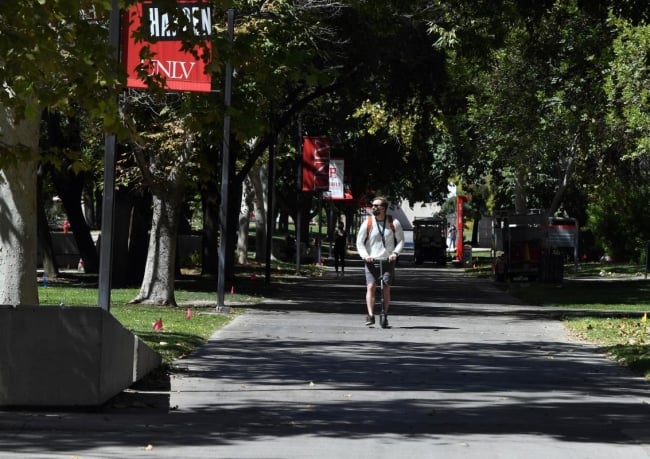You have /5 articles left.
Sign up for a free account or log in.

More American campuses are banning micromobility devices such as e-scooters after student injuries and deaths.
Ethan Miller/Getty Images
Scooters, hoverboards and other battery-powered devices have become favored modes of transportation for getting students quickly across sometimes sprawling campuses, but critics say the micromobility devices have become so ubiquitous—and are often driven so recklessly—that they pose a safety hazard to pedestrians as well as the students and others using them.
After a spate of bans on the equipment when they first started proliferating on campuses several years ago, college officials have recently begun banning them again after the electric or motorized devices resulted in student injuries and deaths.
Fordham University this week announced a ban on the use or storage of all battery-powered e-scooters, e-bikes and e-skateboards on university property. Boston University announced a similar ban earlier this month, citing safety concerns for riders, pedestrians and occupants of campus buildings. Boston University’s ban will go into effect Dec. 22.
“The storage and charging of lithium-ion batteries in residence halls and other University buildings represent a serious hazard, as they may explode, causing injuries and starting fires,” Robert Fitzer, associate vice president of Fordham Public Safety, said in a memo the campus. “Lithium-ion battery fires are chemical reactions that, once underway, cannot be extinguished like traditional fires and create toxic gases that can be deadly in enclosed spaces.”
The fires have caused half a dozen deaths and 140 people to be injured, according to a campuswide email sent by the university’s public safety department.
“This campus isn’t very big—you can walk to class. I’ve been taken out by a scooter before. It’s not fun,” Fordham University student Rebecca Chretien told ABC 7.
A number of other New York institutions, including New York University, Columbia University and Pace University, have already implemented bans on the devices.
“Our priority is the safety of the members of our community and until a time that the safety standards of these devices are improved, the University has prohibited these devices from campus,” a notice in the Pace’s student handbook states. “Should these devices be found on the campus, they will be confiscated by appropriate University staff. Such violations will be referred through the student conduct process.”
Boston College officials say students have reported near collisions and limited access to facilities because of the e-scooters and that numerous students have suffered injuries from falls.
“The decision to implement the electric scooter ban was based on safety concerns, given the issues we have experienced on campus and the number of incidents that have occurred at colleges and universities nationwide,” Jack Dunn, associate vice president of communications at Boston College, wrote in an email explaining the policy. “With a few exceptions, the decision has been very favorably received on the BC campus.”
Other Boston-area institutions, including Harvard, BU and MIT, continue to allow students to use e-scooters on campus but have restrictions on where they can be ridden and parked.
The policies on e-scooters and other personal mobility equipment are not consistent across higher ed, however.
While Loyola University Chicago and Marquette Universities and the University of San Diego have banned the devices, Brown University dispersed 100 e-scooters across campus in 2021 for free use as part of an initiative to decrease university transportation emissions. Meanwhile, the University of Notre Dame prohibits the use of rented e-scooters but not those owned by students. (Note:This paragraph was revised to indicate that Notre Dame only bans scooters rented from companies located off-campus.)
San Diego State University placed a ban on micromobility devices in 2019 but failed to inform students about the ban until five months after it was approved by the University Senate. The ban was in place for two years until it was replaced with a new policy allowing the use of the devices only in designated areas such as bike paths and docking areas. The decision is based on a noted change in the micromobility rental landscape and technology and a California State University system requirement to evaluate demand in transportation and accessibility on campus, according to a statement made by the university.
“The ban was made with vague and inconsistent data used to paint electric scooters as dangerous. Hardly any students were consulted about the ban,” Jack Molmud, an alumnus of San Diego State University, tweeted when the ban was lifted.
Some students believe e-scooters can still be used with specific restrictions in place to avoid injuries. Luke James, a student at the University of Oklahoma, made a TikTok video for a class presentation that displayed the dangers of campus scooters and advocated for students to be required to ride the scooters in bike lanes. He also suggested that fines for students who don’t use the designated lanes or those who walk in them would decrease injuries.
Debates about the safety of e-scooters and hoverboards are not new. When hoverboards became a popular trend in 2016, more than 30 colleges banned them after numerous fires and injuries, according to USA Today. The Consumer Product Safety Commission at the time announced an investigation into 28 fires in 19 states caused by hoverboards.




